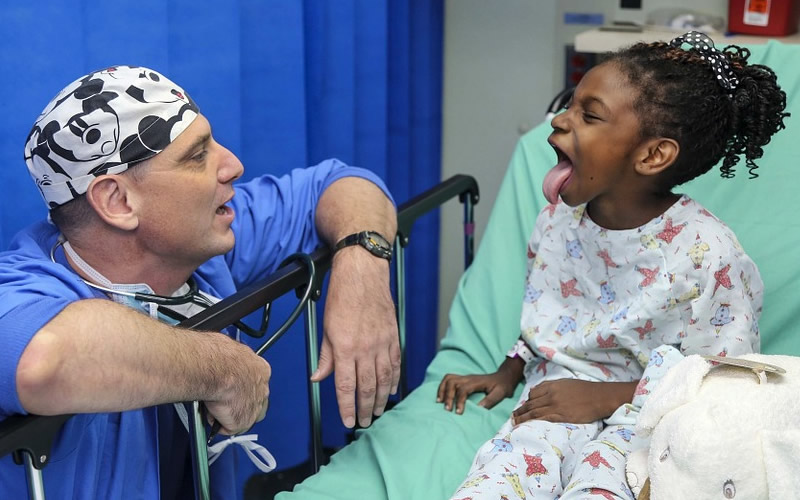
By Lindsay Street, Statehouse correspondent | About 20,000 more children in South Carolina will be able to qualify for a government insurance program should a proposal in the House’s budget go forward.
On Wednesday, representatives voted 100-2 to pass the state’s $9.3 billion spending plan for state tax revenues for 2019-2020.

S.C. Rep. Bill Herbkersman, R-Beaufort, ironed out details in the budget-writing subcommittee to dole out an additional $23 million to get more uninsured children in the state coverage. The state and federal Children’s Health Insurance Program covers children not covered by Medicaid.
The move was hailed by children’s advocacy group Children’s Trust of South Carolina.
“Expanding CHIP will give more children in South Carolina access to health care including critical early screenings that can help families identify and seek immediate help for any physical and developmental delays. When children get the help they need early in life, it prevents more costly interventions later. This is a prevention strategy that will save money in the long run,” Chief Communications Officer Bett Farrell Williams wrote in a statement to Statehouse Report.
Currently, CHIP in South Carolina limits eligibility to those at 208 percent of the federal poverty level or below. For example, a family of four would have to earn less than $53,560.
“It will enable more South Carolina children to have access to health coverage than ever before,” Herbkersman said. In a Feb. 20 meeting, he said South Carolina has one of the lowest eligibility limits in the nation. He said the House proposal would bring the state in-line with the rest of the Southeast.
“Kids who get good health checkups do better in school,” he told Statehouse Report.
While the budget debate at one point lasted 13 hours, the CHIP proposal was never brought up and remained. It will be up to the Senate and conference to keep the proposal as the budget inches its way to the governor’s desk.
Here are some other highlights from the House budget:
- $35 million of the $61 million coming to state coffers from the $1.5 billion lottery ticket is slated for taxpayer rebates — $50 for each taxpayer;
- State employees will see a 2 percent raise ($41 million from recurring revenues); and,
- Minimum pay for new teachers will increase to $35,000 and current teachers can receive a minimum of a 4 percent raise ($159 million recurring).
The two dissenting votes on the budget came from Upstate Republicans Jonathon D. Hill and Josiah Magnuson. The two pushed for an amendment effectively banning abortion in the state, and removing all state dollars to abortion-providing clinics for non-abortion services.
Senate Finance subcommittees begin meeting March 19 to address agency requests.
In other news:
![]() Santee Cooper sale still up in air. Senators are signaling they are skeptical about selling the public utility Santee Cooper. The investigation into a possible sale of the utility came after a failed nuclear expansion project that blew $9 billion into unfinished reactors, money that was shouldered by debt by Santee Cooper and by raising rates for South Carolina Electric & Gas customers. Read more.
Santee Cooper sale still up in air. Senators are signaling they are skeptical about selling the public utility Santee Cooper. The investigation into a possible sale of the utility came after a failed nuclear expansion project that blew $9 billion into unfinished reactors, money that was shouldered by debt by Santee Cooper and by raising rates for South Carolina Electric & Gas customers. Read more.
State crime labs reportedly struggling. State Law Enforcement Division DNA analyst Jennifer Clayton emailed lawmakers this week and said there is a backlog of cases forcing the division to rush jobs. She asked for more money to add analysts to the staff there. Clayton wrote the email as a “worn-out” employee and “concerned citizen.” Read more.
Kinship care day scheduled. The second annual Kinship Care Day is scheduled for 10:45 a.m. March 19 at the Statehouse grounds. The day is to call attention to and salute caregivers and supporters in the state. The program will highlight updates on current legislation like S.191 and include state lawmakers, DSS officials, local kinship care supporters and kinship caregivers.
Weekly update on Palmetto Priorities
 Throughout the legislative session, we’ll provide you relevant updates related to our list of Palmetto Priorities, which are 10 big policy areas where major progress is needed for South Carolina to escape the bottom of lots of lists. Over the last week:
Throughout the legislative session, we’ll provide you relevant updates related to our list of Palmetto Priorities, which are 10 big policy areas where major progress is needed for South Carolina to escape the bottom of lots of lists. Over the last week:
ENVIRONMENT: Drinking water in S.C. called into question. A major investigative piece by The State shows that more than 90,000 residents have been exposed to dangerous drinking water in more than 200 small water systems in the state. Read the series here.
HEALTH CARE: Medical marijuana panel meets. The Senate Medical Affairs subcommittee addressing S. 366, the “S.C. Compassionate Care Act,” will meet 9:30 a.m. March 20 in room 207 of the Gressette Room. Read the agenda here.
POLITICS: ‘Cooling off’ period introduced for lawmakers. Democratic Sens. Thomas McElveen of Sumter and Dick Harpootlian of Columbia have introduced a bill that would mandate a period of time before former legislators could take certain state jobs. Read more.
PRISONS: Minimum bail amount floated in Senate. Sen. Sandy Senn, R-Charleston, has introduced legislation backed by the 9th Circuit Solicitor Scarlett Wilson that aims at raising the minimum bail amount for repeat offenders. Read more.
Looking ahead
Alliance Party organizing March 23. The party formerly known as the American Party of South Carolina — which has not merged into the new Alliance Party — is holding an organizational meeting 1 p.m. to 5 p.m. March 23 at the Columbia Conference Center. The group says it holds core values of common ground, term limits, campaign finance reform, and “public service-motivated” candidates. More info.
Click below for other items coming up in the Statehouse:
- House calendar
- Senate calendar
- Have a comment? Send to: feedback@statehousereport.com















 We Can Do Better, South Carolina!
We Can Do Better, South Carolina!